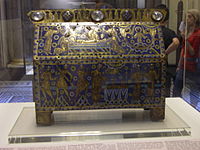Colloquies
[3] The colloquies were generally written in a graceful, easy style and gentle (though sometimes scathing) humor that made them continually sought as schoolboy exercises and adult light reading for generations.
[4] The Colloquies were widely translated, but often with selections, expurgations, adjustments and reinterpretation to suit sectarian agendas, and sometimes with Erasmus' authorship muted.
Sophrinius says he will assist her, either to pay her dowry to marry, or to help her join a convent for cracked women, or to go to some far-away place and start a new life.
The lengthy Peregrinatio religionis ergo[9] deals with many serious subjects humorously; it scandalously (e.g. to Peter Canisius[10]) includes a letter supposedly written by a Statue of the Virgin Mary, in which it initially thanks a reformer for following Luther against needlessly invoking saints (where the listed invocations are all for sinful or wordly things), but then warns that this "conveniency" has brought even greater "inconveniency" from those who want "to strip the Altars and Temples of the Saints everywhere."
Erasmus was in discussions on making the response to Luther that became On Free Will (and On the Immense Mercy of God), and his approach was to contain heresy by conciliation.
[12] Erasmus' last colloquy, Epicureus is, despite its form, a piece of great interest to scholars, as in it Erasmus discusses various classical Greek philosophical movements which had fallen out of favour for a millennium following Augustine's Aristoteleanism: the Stoics, Cynics, the Peripatetics, before inventing a novel Christian Epicureanism[13] by equating pleasure with faith and a clear conscience.



